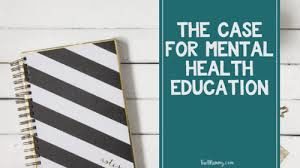
PARENT EDUCATION IS CRITICAL

The experts are publishing. Well, don’t they always?
According to the Centers for Disease Control and Prevention, “Across the United States, up to one in five children suffers from a mental disorder in a given year.”
This equates, according to the report, to more than 17 million young people who meet criteria for disorders that affect their ability to learn, behave, and express their emotions.
While the discussion surrounding these findings focuses on professional intervention, parents and the home environment that circumstance establish as the atmosphere they raise their children in, needs to be addressed as a key factor at the top of the mental health pyramid.
The relationship between children and their families and the communities in which they live must be given the same priority as professional intervention. Or, at least, families and communities must be included in any development plan designed to address the mental health issues of children.
School-related programs designed to identify and assist children in need of intervention are said to produce positive outcomes.
However, if parents had the opportunity to gain basic knowledge in identifying early symptoms of children’s behavior that reflected mental health disorders, and if services were made available to them in their communities, this approach could establish, for families, the ability to change the discomfort level many parents talk about experiencing when they are approached by the school psychiatrist.
Samantha said her son was fidgety from the time she brought him home from the hospital nursery and the fidgeting increased as he grew older.
As a newborn, his sleep patterns never allowed Samantha a full night’s sleep, she complained, and went on to say it made her “cranky” during the day which turned out, for her, to mean she didn’t want to spend time with her baby.
As a toddler, Samantha said, the boy never stayed still. She couldn’t take him places because he moved quickly and got into troublesome things like wanting to stick his finger in the electric wall socket at her friend’s house.
He was troublesome when it came to eating. He was more trouble when it came to the clothes she bought for him because he said they itched and he said the same thing about the sheets and blankets on his bed.
No, she didn’t report any of this to the pediatrician because she didn’t see what was going on as a medical condition, and Samantha had absolutely no idea that children had mental health problems. She’d never heard of ADHD, and the behaviors she talked about pretty much fit into this diagnosis.
Rodney was just a little more than 5 years-old when the police crashed into the neighbor’s apartment door with weapons drawn and handcuffed all the “homies” who were sitting around in the living room doing drugs.
Rodney, his mother said, was fascinated by all the flashing lights on the dozens of police cars, their sirens, and all the neighbors he was standing outside with on the street as the “bust” went down.
Rodney had lots of questions his mother couldn’t answer. She said he became withdrawn after awhile and didn’t ask any more questions and didn’t even talk very much.
Back to Samantha. Perhaps Samantha could have gotten her son help had she know that was what he needed. Experts directing attention to educating parents as a top priority would have worked here.
Rodney’s mom? She had no clue that the environment in which she lived would play havoc on her young son’s mental stability.
Where are the experts when it comes to making our communities safer for children?
Families and the communities in which they raise their children are the bedrock of the documented children’s mental health issues that the experts report on.
Comments are closed.




I agree mental health needs to become foremost. We seem to ignore the issue, I was lucky I had a great pediatrician who always discussed the child’s emotional as well as physical condition. I now understand how helpful to me a mother i not shying away from Mental health for my children